Intro: Max PSI and its effect on trailer tire performance
Trailer tires are specially crafted for trailer use, catering to their specific needs. They differ from passenger car tires or truck tires. These are designed to carry heavy loads and have a higher load capacity. Trailer tires are built to withstand the unique stresses and forces of trailer use. In this article we will learn about Max PSI and its effect on trailer tire performance.
Trailer tires have a stiffer sidewall construction to support the weight of the trailer and its contents. They also tend to have shallower treads than other types of tires. This helps to reduce heat build-up and improve stability while towing.
It’s important to note that trailer tires should only be used on trailers, as they are not suitable for use on other types of vehicles.

Many transport trucks parked at a service station at sunset.
What is max PSI and why is it important?
Max PSI stands for maximum pounds per square inch, and it refers to the maximum amount of air pressure that a tire is designed to handle. It is important because exceeding the maximum PSI can cause a tire to fail. Running a tire with low PSI can cause it to wear unevenly and reduce its lifespan. Every tire has a specific maximum PSI rating indicated on the sidewall of the tire. It is also important to note that the recommended PSI for a tire may be different from the maximum PSI. So, it is important to refer to the owner’s manual or the tire manufacturer’s recommendations for the correct inflation pressure for your specific vehicle and tire.
Max PSI: Effect on trailer tire performance
Underinflated and overinflated tires can have negative effects on trailer performance and safety.
Underinflated tires can cause the trailer to sway or bounce, reduce stability, and increase the risk of a blowout or tire failure. The increased flexing of the tire sidewall caused by underinflation can also cause excessive heat build-up. This can lead to premature tire wear or failure.
Overinflated tires can also cause instability and reduce traction, particularly on wet or slippery surfaces. Overinflated tires can also be more susceptible to punctures and other forms of damage. This is because they have less cushioning and are more prone to impact damage.
In addition to affecting trailer performance, underinflated and overinflated tires can also impact fuel efficiency and tire lifespan. Underinflated tires increase rolling resistance. This can cause the trailer to require more energy to move, reducing fuel efficiency. Overinflated tires can cause the tire tread to wear unevenly, reducing the overall lifespan of the tire.
Therefore, it is important to maintain the proper tire pressure as recommended by the tire manufacturer and the trailer manufacturer. Regularly checking the tire pressure and adjusting it as necessary can help improve trailer performance, safety, and lifespan.
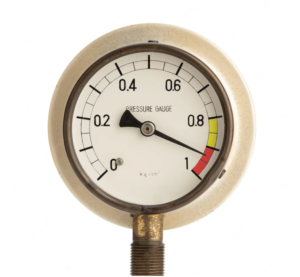
What is the effect of Max PSI on trailer tire performance?
Inflating trailer tires to the max PSI recommended by the tire manufacturer can provide several benefits, including:
Improved load carrying capacity:
Inflating tires to the maximum PSI ensure that the tires can handle their maximum load carrying capacity. This helps prevent overloading and ensures that the trailer can carry its intended payload safely.
Better stability and handling:
Properly inflated tires help maintain stable and predictable handling. This is important when towing a trailer. This can help prevent swaying, bouncing, and other unstable handling characteristics.
Improved fuel efficiency:
Inflating tires to the maximum PSI can reduce rolling resistance. This is the force that must be overcome to keep the trailer moving. Reduced rolling resistance can lead to improved fuel efficiency, which is especially important for long trips or frequent trailer use.
Longer tire lifespan:
Properly inflated tires are less likely to wear out prematurely due to excessive wear or damage. Tires that are underinflated or overinflated can wear out unevenly. This can reduce their lifespan and requiring more frequent replacement.
Safer driving:
Inflating tires to the maximum PSI helps prevent blowouts, which can be dangerous and cause loss of control of the vehicle. Proper tire pressure also helps ensure that the tires can perform optimally. Max PSI provides better traction and handling in emergency situations.
It is important to note that inflating tires to max PSI is only recommended if it is within the allowable range for the trailer and the tire. It should also not be above the max PSI rating specified on the tire sidewall. Additionally, max PSI should only be used if it is consistent with the load capacity and speed rating of the trailer and tire.
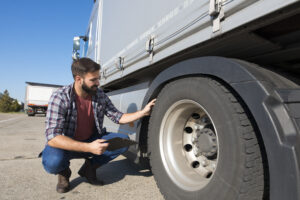
Max PSI and its negative effect on trailer tire performance:
Inflating trailer tires to the max PSI is recommended if it is within the allowable range for the tire and the trailer.
However, there are a few scenarios in which inflating trailer tires to the maximum PSI may have negative effects on performance. These include:
Reduced ride comfort:
Inflating tires to the maximum PSI can result in a stiffer ride, which may be less comfortable for passengers or cargo.
Reduced traction:
Overinflated tires may have reduced contact with the road. This can reduce traction and increase the risk of skidding or sliding, especially in wet or slippery conditions.
Uneven tire wear:
Overinflated tires can wear unevenly, with the centre of the tire wearing more quickly than the edges. This can reduce the overall lifespan of the tire and require more frequent replacement.
Increased risk of tire damage:
Overinflated tires are more susceptible to punctures and other forms of damage. This is due to less cushioning and are more prone to impact damage.
It is important to note that the maximum PSI listed on a tire sidewall is the maximum cold inflation pressure. This means that the tire should be inflated to that pressure when it is cold (before driving). If a tire is inflated when it is hot (after driving), the pressure can increase and exceed the maximum PSI. Now this can be dangerous. Therefore, it is recommended to check and adjust tire pressure when the tires are cold for accuracy.
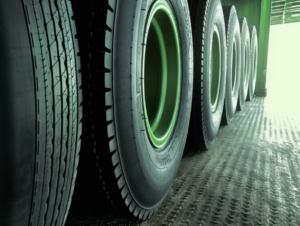
Factors to consider when deciding on PSI level for your trailer tire performance-
When deciding on the appropriate PSI level for a trailer tire, there are several factors to consider. These include:
Manufacturer recommendations: The first and most important factor is the manufacturer’s recommended PSI level for the specific tire and trailer combination. This information can usually be found in the owner’s manual or on the tire sidewall.
Load capacity:
The load capacity of the trailer and the weight of the cargo being transported will also affect the recommended PSI level. The tire pressure should be set to ensure that the tires can safely carry the weight of the cargo without being over or underinflated.
Speed rating:
The maximum PSI level may be affected by the speed rating of the tire. Some higher speed-rated tires may require a lower PSI level to maintain optimal performance.
Ambient temperature:
The ambient temperature can affect the recommended PSI level for a tire. In general, tire pressure should be adjusted upward by 1 PSI for every 10 degrees Fahrenheit increase in ambient temperature.
Road conditions:
The type of road surface and the weather conditions can also affect the recommended PSI level. Tires may need to be inflated to a slightly higher or lower PSI level. This will depend on whether the road is smooth or rough, and whether there is rain or snow on the road.
Personal preference:
Some drivers may prefer to adjust tire pressure to achieve a certain level of ride comfort or handling performance. It is important to keep in mind, however, that deviating too far from the manufacturer’s recommended PSI level can have negative effects on tire performance and safety.
By following the manufacturer’s recommendations, drivers can ensure appropriate PSI level for their trailer tire’s for safe and optimal performance.
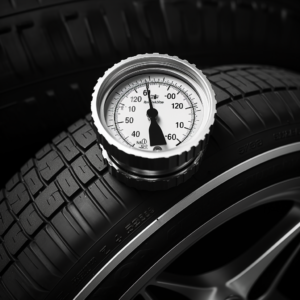
How to determine the correct PSI level for your trailer tires?
To determine the correct PSI level for your trailer tires, follow these steps:
Consult the owner’s manual:
The owner’s manual for the trailer should provide the manufacturer’s recommended tire pressure for the specific make and model of the trailer.
Check the tire sidewall:
The tire sidewall will also indicate the maximum PSI level recommended for the tire. It is important to note that this is the maximum cold inflation pressure and not necessarily the recommended pressure for the trailer.
Determine the weight of the trailer and cargo:
Use a scale to weigh the trailer and the cargo that will be transported. Add the weights together to determine the total weight.
Check load capacity:
Refer to the tire load capacity chart to ensure that the total weight of the trailer and cargo is within the load carrying capacity of the tire.
Adjust PSI level:
Adjust the tire pressure as needed to ensure that it is within the recommended range provided by the manufacturer. In general, the tire pressure should enable the trailer to safely carry the weight of the cargo without being over or underinflated.
Monitor tire pressure:
Regularly check the tire pressure using a tire gauge to ensure that it remains within the recommended range. It is recommended to check tire pressure when the tires are cold for accuracy.
By following these steps, you can determine the correct PSI level for your trailer tires and ensure safe and optimal performance while towing.

Here are some tips for maintaining proper PSI level for your trailer tire performance:
Check tire pressure regularly:
It is important to regularly check tire pressure to ensure that it is within the recommended range. Tire pressure should be checked when the tires are cold. Heat from driving can cause the pressure to increase and give an inaccurate reading.
Use a reliable tire gauge:
Use a reliable tire pressure gauge to check the pressure. Digital gauges tend to be more accurate than analogue gauges.
Inflate to the correct pressure:
Inflate the tires to the correct PSI as recommended by the manufacturer for the specific tire and trailer combination. Do not exceed the max PSI level listed on the tire sidewall.
Check pressure before each trip:
Before each trip, check the tire pressure to ensure that it is within the recommended range. This is especially important if the trailer has been sitting for an extended period.
Keep tires clean and free of damage:
Inspect the tires regularly for signs of damage, such as cuts or punctures, and keep them clean. Damage or debris on the tire can cause pressure to drop or the tire to fail.
By following these tips, you can maintain the proper PSI level for your trailer tire performance.
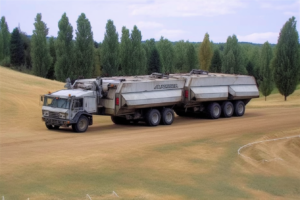
Common myths about tire inflation debunked-
- Myth: Tires should be inflated to the pressure listed on the tire sidewall.
Truth: The PSI level listed on the tire sidewall is the maximum PSI level for the tire and not necessarily the recommended level for the specific trailer. The recommended PSI level can vary based on the make and model of the trailer and should be found in the owner’s manual.
- Myth: Crossing the max PSI level of the tires will increase fuel efficiency.
Truth: Overinflating the tires can decrease fuel efficiency by reducing traction and causing uneven wear on the tires. It can also increase the risk of a blowout or other tire failure.
- Myth: You only need to check PSI level when you notice a problem.
Truth: Tire pressure should be checked regularly, at least once a month, even if you do not notice any problems. It is important to maintain the proper tire pressure to ensure optimal performance and safety while driving.
- Myth: You should only inflate tires when they are warm.
Truth: Tire pressure should be checked and adjusted when the tires are cold. Heat from driving can cause the pressure to increase and give an inaccurate reading.
- Myth: You can use any tire pressure gauge to check tire pressure.
Truth: Different tire pressure gauges can have different levels of accuracy. It is important to use a reliable gauge and to calibrate it regularly to ensure accurate readings.
By understanding the truth behind these common myths, take the necessary steps to maintain the proper PSI and ensure good trailer tire performance.
Max PSI and its effect on trailer tire performance:Final Takeaway
In conclusion, the maximum PSI level listed on trailer tires is the highest level of pressure that the tire can safely handle. Max PSI inflation can have both positive and negative impact on trailer tire performance. Regularly checking and adjusting tire pressure to maintain the recommended PSI level can help improve trailer tire performance. Make sure to follow the facts mentions above and you will be good to go!
